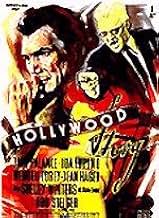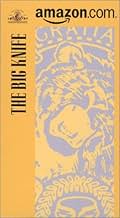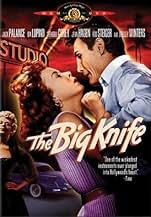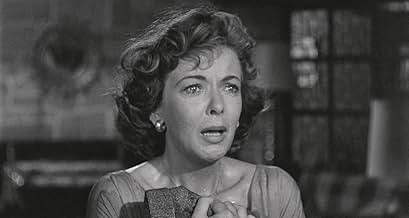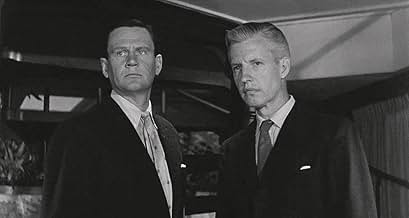AVALIAÇÃO DA IMDb
6,8/10
4,7 mil
SUA AVALIAÇÃO
Adicionar um enredo no seu idiomaHollywood actor Charles Castle is pressured by his studio boss into a criminal cover-up to protect his valuable career.Hollywood actor Charles Castle is pressured by his studio boss into a criminal cover-up to protect his valuable career.Hollywood actor Charles Castle is pressured by his studio boss into a criminal cover-up to protect his valuable career.
- Prêmios
- 1 vitória e 2 indicações no total
Michael Winkelman
- Billy Castle
- (as Mike Winkelman)
Shelley Winters
- Dixie Evans
- (as Miss Shelley Winters)
Richard Boone
- Narrator
- (narração)
- (não creditado)
Nick Cravat
- Nick
- (não creditado)
Robert Emhardt
- Bit Part
- (não creditado)
Michael Fox
- Prize Fight Announcer
- (não creditado)
Paula Kyle
- Party Guest
- (não creditado)
- Direção
- Roteiristas
- Elenco e equipe completos
- Produção, bilheteria e muito mais no IMDbPro
Avaliações em destaque
The Big Knife is not for everybody. Some will find it very literate, well-directed and acted(mostly), handling the tense and satire aspects deftly, while others will find it overdone. Both viewpoints are completely understandable, for me there were parts where the film did fall into the latter camp but most of the time it was the former.
As an adaptation of the stage play, which is very compelling and thought-provoking, it is very faithful and translates well adaptation-wise. As a film, it's far from perfect but it comes over well as a film.
There are a few things that don't come off quite as successfully as the rest of the film. Rod Steiger has a very ruthless character, but for my tastes Steiger plays the role too broadly to the point that Hoff felt more of a cartoonish caricature than a real person, to the extent that it came close to hurting the balance of the film and he didn't come over as very threatening. In his performance, there is a lot of camp and scenery-chewing, but not enough of the menace that the role so ruthlessly written needs. The ending does dissolve into contrived melodrama, which is where it is most understandable as to why some will find the film overdone, and felt rushed as well. Lastly, the film does feel over-scored in places, in the places where there is music the blaring music cues felt intrusive.
With the exception of Steiger, the performances are very good. Jack Palance's powerhouse lead performance is one of his best, while Ida Lupino is heart-wrenching and dignified. Wendall Corey wisely underplays and is very entertaining, and Everett Sloane, Jean Hagen(chilling in a role so different to hers in Singin' In the Rain) and a memorable Shelley Winters(in a performance that hits hard) do equally pleasingly. The script is remarkably literate and intelligent, with the tension being portrayed quite realistically and the satire being boldly lacerating. The story moves deliberately, but the tension present is enough to haunt the mind and the subject matter is a bold one and told in a biting, sometimes fun and poignant way. The Big Knife is photographed with class and atmosphere, the production values are appropriately claustrophobic and Robert Aldrich's direction is more than able, often excellent.
Overall, a very acquired taste, but for this viewer while not without flaws it was a well done film. 7/10 Bethany Cox
As an adaptation of the stage play, which is very compelling and thought-provoking, it is very faithful and translates well adaptation-wise. As a film, it's far from perfect but it comes over well as a film.
There are a few things that don't come off quite as successfully as the rest of the film. Rod Steiger has a very ruthless character, but for my tastes Steiger plays the role too broadly to the point that Hoff felt more of a cartoonish caricature than a real person, to the extent that it came close to hurting the balance of the film and he didn't come over as very threatening. In his performance, there is a lot of camp and scenery-chewing, but not enough of the menace that the role so ruthlessly written needs. The ending does dissolve into contrived melodrama, which is where it is most understandable as to why some will find the film overdone, and felt rushed as well. Lastly, the film does feel over-scored in places, in the places where there is music the blaring music cues felt intrusive.
With the exception of Steiger, the performances are very good. Jack Palance's powerhouse lead performance is one of his best, while Ida Lupino is heart-wrenching and dignified. Wendall Corey wisely underplays and is very entertaining, and Everett Sloane, Jean Hagen(chilling in a role so different to hers in Singin' In the Rain) and a memorable Shelley Winters(in a performance that hits hard) do equally pleasingly. The script is remarkably literate and intelligent, with the tension being portrayed quite realistically and the satire being boldly lacerating. The story moves deliberately, but the tension present is enough to haunt the mind and the subject matter is a bold one and told in a biting, sometimes fun and poignant way. The Big Knife is photographed with class and atmosphere, the production values are appropriately claustrophobic and Robert Aldrich's direction is more than able, often excellent.
Overall, a very acquired taste, but for this viewer while not without flaws it was a well done film. 7/10 Bethany Cox
One of the 10 best of '55 with sparks flying between Palance & Steiger. Subtle performance by Ms. Ida Lupino and intensity personified by J. Palance. Rod Steiger with white hair and hearing aid is pretty scary. Written by Clifford Odets, this realistic Hollywood tale cuts no corners and does not see out.
An 8 out of 10. Best performance = Rod Steiger. Too grim for some. Beautiful B/W cinematography and terrific script and the entire cast is deliberate and impassioned. I don't believe it was nominated for anything, but should have been. I'm not sure if this is on video or DVD, but check it out!
An 8 out of 10. Best performance = Rod Steiger. Too grim for some. Beautiful B/W cinematography and terrific script and the entire cast is deliberate and impassioned. I don't believe it was nominated for anything, but should have been. I'm not sure if this is on video or DVD, but check it out!
"The Big Knife" is really a stage play recorded on film. It's a Hollywood soap opera that features a lot of good actors eating the scenery. Rod Steiger and Everett Sloan are great as the monstrous studio honcho and weaselly agent, respectively. Jack Palance is a competent actor but was woefully miscast as the sensitive, tortured matinée idol -- nobody would ever confuse Palance with a matinée idol. Nevertheless, he does an adequate job.
The power of the studio system in the '50s is well depicted, if a bit overwrought. Steiger's performance is particularly delicious as his toweringly self-centered character cries, wheedles, and intimidates his underlings into doing what he wants.
The movie is showing its age but its excesses, especially its colorful language, are a lot of fun. Recommended, 7 out of 10.
The power of the studio system in the '50s is well depicted, if a bit overwrought. Steiger's performance is particularly delicious as his toweringly self-centered character cries, wheedles, and intimidates his underlings into doing what he wants.
The movie is showing its age but its excesses, especially its colorful language, are a lot of fun. Recommended, 7 out of 10.
Unless you understand that The Big Knife was Clifford Odets's one finger salute to Hollywood and its mores, you will not understand the film at all. Odets after some bad times in tinseltown went back to his first love which was the theater and wrote this play which ran for 109 performances in the 1949 season on Broadway.
In the lead roles of actor Charlie Castle and producer Marcus Hoff, Odets cast a couple of guys who were having difficulty finding employment in Hollywood at that time as well, kindred spirits from the Group Theater back in the day, John Garfield and J. Edward Bromberg. Garfield who certainly could bring his own life into the part plays Odets himself who had as tempestuous personal life as his creation Charlie Castle. He feels starved creatively because of the junk he's been doing in Hollywood, not the stuff of social significance that Odets did back Group Theater days.
Jack Palance plays Castle in the film and while he does justice to the part I only wish John Garfield had lived to do the screen version of what he created. He had an unceasing rebellion against Warner Brothers for the stereotypical tough guys parts he was being cast in. But just after he broke free came the blacklist.
Rod Steiger is malevolence itself as the producer whom I believe was based on Louis B. Mayer. Odets dealt with him through his then wife Luise Rainer over at MGM. Mayer was not liked even by his fellow studio moguls and he had been toppled in a studio power play at MGM a few years earlier. Had he still been in charge at MGM, I'm willing to bet The Big Knife might never have been made even as an independent film with a United Artists release.
Director Robert Aldrich filled out the rest of the cast with familiar Hollywood names like Ida Lupino as Palance's estranged wife, Everett Sloane as his long suffering agent, Wendell Corey in a role that has to be modeled on MGM's fixer who knew where all the bodies were buried Eddie Mannix, Shelley Winters as the bimbo like starlet who can put an end to Palance's career and Ilka Chase as a Hedda Hopper like columnist who is the self appointed keeper of the Hollywood morals. Chase's scenes are at the beginning of the film and she really has the columnist character dead on.
On stage the entire play is set in the living room of the Palance/Lupino Hollywood style mansion. Like the house in Long Day's Journey Into Night, the opulent living room becomes a character itself, showing the velvet and comfortable trap that Palance is in and why he just can't give up all this comfort, even for the art that used to motivate him.
Odets might have done better had someone else a little more dispassionate had written this based on his memoirs. The Big Knife gets a little too personal at times. And it never quite loses the stage origin even with a few scenes away from the house. But the acting his first rate from a first rate cast. I'd watch The Big Knife as a look into the mind of Clifford Odets.
In the lead roles of actor Charlie Castle and producer Marcus Hoff, Odets cast a couple of guys who were having difficulty finding employment in Hollywood at that time as well, kindred spirits from the Group Theater back in the day, John Garfield and J. Edward Bromberg. Garfield who certainly could bring his own life into the part plays Odets himself who had as tempestuous personal life as his creation Charlie Castle. He feels starved creatively because of the junk he's been doing in Hollywood, not the stuff of social significance that Odets did back Group Theater days.
Jack Palance plays Castle in the film and while he does justice to the part I only wish John Garfield had lived to do the screen version of what he created. He had an unceasing rebellion against Warner Brothers for the stereotypical tough guys parts he was being cast in. But just after he broke free came the blacklist.
Rod Steiger is malevolence itself as the producer whom I believe was based on Louis B. Mayer. Odets dealt with him through his then wife Luise Rainer over at MGM. Mayer was not liked even by his fellow studio moguls and he had been toppled in a studio power play at MGM a few years earlier. Had he still been in charge at MGM, I'm willing to bet The Big Knife might never have been made even as an independent film with a United Artists release.
Director Robert Aldrich filled out the rest of the cast with familiar Hollywood names like Ida Lupino as Palance's estranged wife, Everett Sloane as his long suffering agent, Wendell Corey in a role that has to be modeled on MGM's fixer who knew where all the bodies were buried Eddie Mannix, Shelley Winters as the bimbo like starlet who can put an end to Palance's career and Ilka Chase as a Hedda Hopper like columnist who is the self appointed keeper of the Hollywood morals. Chase's scenes are at the beginning of the film and she really has the columnist character dead on.
On stage the entire play is set in the living room of the Palance/Lupino Hollywood style mansion. Like the house in Long Day's Journey Into Night, the opulent living room becomes a character itself, showing the velvet and comfortable trap that Palance is in and why he just can't give up all this comfort, even for the art that used to motivate him.
Odets might have done better had someone else a little more dispassionate had written this based on his memoirs. The Big Knife gets a little too personal at times. And it never quite loses the stage origin even with a few scenes away from the house. But the acting his first rate from a first rate cast. I'd watch The Big Knife as a look into the mind of Clifford Odets.
"The Big Knife" caused a sensation when it came out. After all, no one in his right mind would dare to criticize the movie industry, after all, it was the studio and its ruthless executives that were exposed as the bad guys, even at the time where the old studio system was disappearing.
Clifford Odets wrote the original play, which under Robert Aldrich direction doesn't translate to the screen because it feels claustrophobic in many aspects. The movie treatment was by James Poe, did not make the material come alive because of the theatricality of the source.
Charles Castle, an actor working in Hollywood, is about to commit himself to a renewal of his contract to a major studio. That means another seven years of his life working in whatever pictures the higher ups have in store for him. It couldn't come at a worse time; his wife, Marion, who evidently hasn't a good relation with Charles, is fed up with the idea of staying in Bel Air. Marion pleads with him to give up the movie business so they could have a normal life bringing up their young son.
Castle has had his share of adventures in Hollywood, something that Marion is aware of. In addition to that, he has a dark secret, something that involved a terrible accident for which his publicist has taken the blame and has even serve time in jail. A couple of women are also in the picture, threatening Charles' marriage.
To make matters worse, Charles is visited by the head of the studio, Stanley Hoff, who has brought his assistant, the oily Smiley Coy, to help him convince Castle to sign the contract. Charles Castle is finally defeated at the game as Stanley plays his cards right since he has the upper hand. The result is a bitter loss for the actor, who sees no way out of the situation at hand.
Jack Palance, who, up to this film, had only minor parts, rose to the challenge of playing Charles Castle, who in a way, he had the background, having been a boxer, to play. His work, although a bit unsure, was a revelation to the movie going public at the time. Ida Lupino, an excellent actress, is probably the best thing in the picture. Rod Steiger shows up as the studio head Stanley Hoff, a man that knows well his opponent's weaknesses and uses all in his power to get his way. Wendell Corey, in a small part, also does good work. Jean Hagen and Shelley Winters also contribute to the film.
Ernest Lazlo's cinematography works well, as does the musical score by Frank DeVol. Robert Aldrich, a man with a lot of experience in the business, was a natural choice to undertake the direction of this picture. His only problem was a basic one, how to open the play to cinematic terms.
Clifford Odets wrote the original play, which under Robert Aldrich direction doesn't translate to the screen because it feels claustrophobic in many aspects. The movie treatment was by James Poe, did not make the material come alive because of the theatricality of the source.
Charles Castle, an actor working in Hollywood, is about to commit himself to a renewal of his contract to a major studio. That means another seven years of his life working in whatever pictures the higher ups have in store for him. It couldn't come at a worse time; his wife, Marion, who evidently hasn't a good relation with Charles, is fed up with the idea of staying in Bel Air. Marion pleads with him to give up the movie business so they could have a normal life bringing up their young son.
Castle has had his share of adventures in Hollywood, something that Marion is aware of. In addition to that, he has a dark secret, something that involved a terrible accident for which his publicist has taken the blame and has even serve time in jail. A couple of women are also in the picture, threatening Charles' marriage.
To make matters worse, Charles is visited by the head of the studio, Stanley Hoff, who has brought his assistant, the oily Smiley Coy, to help him convince Castle to sign the contract. Charles Castle is finally defeated at the game as Stanley plays his cards right since he has the upper hand. The result is a bitter loss for the actor, who sees no way out of the situation at hand.
Jack Palance, who, up to this film, had only minor parts, rose to the challenge of playing Charles Castle, who in a way, he had the background, having been a boxer, to play. His work, although a bit unsure, was a revelation to the movie going public at the time. Ida Lupino, an excellent actress, is probably the best thing in the picture. Rod Steiger shows up as the studio head Stanley Hoff, a man that knows well his opponent's weaknesses and uses all in his power to get his way. Wendell Corey, in a small part, also does good work. Jean Hagen and Shelley Winters also contribute to the film.
Ernest Lazlo's cinematography works well, as does the musical score by Frank DeVol. Robert Aldrich, a man with a lot of experience in the business, was a natural choice to undertake the direction of this picture. His only problem was a basic one, how to open the play to cinematic terms.
Você sabia?
- CuriosidadesBecause of its vitriolic take on Tinseltown, this was unsurprisingly turned down by all the major studios in Hollywood. It eventually found a home at United Artists.
- Erros de gravaçãoThe camera and operator are visibly reflected in one scene in the living room.
- Citações
Smiley Coy: A woman with six martinis can ruin a city.
- Cenas durante ou pós-créditosIn the opening credits: Upholstered furniture by Martin/ Brattrud.
- ConexõesFeatured in Les dossiers de l'écran: Les coulisses du cinéma (1970)
Principais escolhas
Faça login para avaliar e ver a lista de recomendações personalizadas
- How long is The Big Knife?Fornecido pela Alexa
Detalhes
- Data de lançamento
- País de origem
- Idioma
- Também conhecido como
- The Big Knife
- Locações de filme
- Empresa de produção
- Consulte mais créditos da empresa na IMDbPro
Bilheteria
- Orçamento
- US$ 423.000 (estimativa)
- Tempo de duração
- 1 h 51 min(111 min)
- Cor
- Proporção
- 1.85 : 1
Contribua para esta página
Sugerir uma alteração ou adicionar conteúdo ausente


